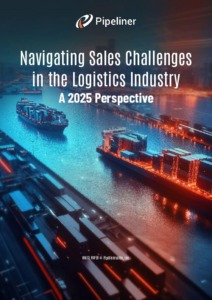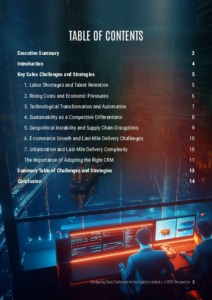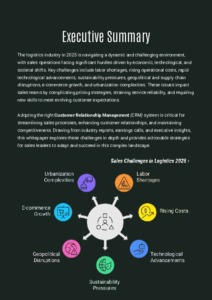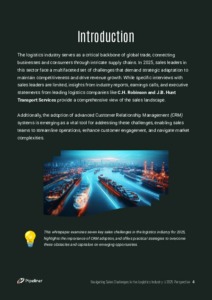The whitepaper, Navigating Sales Challenges in Logistics for 2025, explores the major issues logistics sales teams face due to economic shifts, technological advances, and societal changes. It details seven core challenges—including talent shortages, rising operational costs, tech-driven changes, sustainability demands, geopolitical risks, e-commerce growth, and urban delivery complexities. Additionally, it highlights the strategic importance of effective Customer Relationship Management (CRM) systems in addressing these challenges, enhancing customer service, and maintaining a competitive edge.
Sales Challenges and Strategic Solutions
1. Skilled Labor Shortages and Employee Retention
- Challenge: The logistics industry faces significant workforce gaps, resulting in service delays, reduced quality, and damaged customer relationships.
- Strategies: Enhance training and employee development, offer competitive pay, integrate automated technologies such as warehouse robots, and use CRM tools to improve customer communications and track workforce efficiency.
2. Escalating Costs and Economic Uncertainty
- Challenge: Rising fuel, transportation costs, inflation, and competitive market conditions complicate profitable pricing.
- Strategies: Utilize AI for optimal route planning, secure favorable supplier agreements, broaden service offerings like warehousing, and employ CRM software for real-time price analytics and targeted customer pricing strategies.
3. Rapid Technological Integration and Automation
- Challenge: Sales teams must adapt to rapidly evolving technologies like AI and robotics, which require significant investment and ongoing staff training.
- Strategies: Form strategic partnerships with tech providers, focus on continuous team training, demonstrate tangible customer benefits from technological enhancements, and integrate logistics systems with CRM for actionable, real-time data.
4. Sustainability as a Market Advantage
- Challenge: Customers are increasingly preferring sustainable logistics providers due to regulatory pressure and growing environmental awareness.
- Strategies: Promote eco-friendly measures like electric delivery vehicles and optimized routing, communicate these clearly to customers, and use CRM systems to track environmental performance metrics and customer sustainability preferences.
5. Geopolitical Instability Affecting Supply Chains
- Challenge: Global tensions create unpredictable disruptions, increasing costs and complicating the provision of reliable logistics services.
- Strategies: Build flexible and diverse supply chain networks, invest in real-time monitoring technologies, and utilize CRM platforms for timely, transparent customer communications during disruptions.
6. E-commerce Expansion and Last-Mile Delivery Demands
- Challenge: The boom in e-commerce has significantly increased demand for speedy and transparent last-mile logistics solutions.
- Strategies: Develop micro-fulfillment centers, implement autonomous delivery systems, collaborate with major e-commerce players, and leverage CRM tools to gather and respond to customer feedback and performance metrics.
7. Complex Urban Delivery Due to Increased Urbanization
- Challenge: The rising urban population makes timely last-mile deliveries challenging due to congestion and limited infrastructure.
- Strategies: Introduce advanced solutions, such as drone deliveries and innovative routing systems, and collaborate with city authorities to leverage CRM tools and manage urban logistics effectively, ensuring customers are kept informed and satisfied.


























Comments